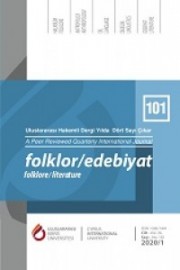Orhan Pamuk’un Kafamda Bir Tuhaflık Adlı Romanını ‘Çatışma ve Göç Kültürü Modeli’ Bağlamında Okumak
Reading the Orhan Pamuk’s Novel Named A Strangeness in My Mind in the Context of ‘Conflict and Migration Culture Model’
Author(s): Hanife Nâlân GençSubject(s): Social history, Novel, Turkish Literature, Migration Studies
Published by: Uluslararası Kıbrıs Üniversitesi
Keywords: a strangeness in my mind; migration; migration culture; conflict model;
Summary/Abstract: Orhan Pamuk’s novel A Strangeness in My Mind which is considered as a postmodern novel with its fiction, style and the narrative coordinates is the 43-year story of the life of the protagonist named Mevlut Karataş in which he migrated from his hometown Beyşehir to İstanbul. From 1969 to 2012, this process witnessed the social, political and economic events of the period. Although Mevlut works in many different jobs in Istanbul such as yoğurt, ice cream and pilaff seller and car park guard, he mainly defines himself as boza seller. Istanbul, described from the eyes of many people in the novel, its streets and its experience spring to life with different meanings in Mevlut’s mind. This city is the only witness of the strangeness in his mind that no one knows or in a more accurate way, he can’t share with anyone. Mevlut’s strangeness in his mind is based on thoughts about love, happiness and choices. Mevlut, who links the main reason for the strangeness in his mind to the changes in the political, economic, social events and situations of the city and questions the events from this point of view, relates it to his observations throughout his entire life. The hero’s first conflicts with work, education and human relations change course with his marriage. The conflict came out by the marriage with the woman whom he chosed instead of her sister as a result of a deception turns into a question in the inner world of him after a while. Throughout her life the city remains alone with its fate and oddities. İstanbul was called as the name of loneliness and alienation, where he emigrated with the desire to have a more healthy life for Mevlut, who tried to hold on to this city while he was fighting for life in Istanbul. Mevlut who reveals a balance of his life and admits to himself that his true love was his first wife, Rayiha, at the end of the novel will continue his journey on the streets of the city with the strangeness of life intention, choice and happiness in his mind.
Journal: Folklor/Edebiyat
- Issue Year: 26/2020
- Issue No: 101
- Page Range: 1-21
- Page Count: 21
- Language: Turkish

